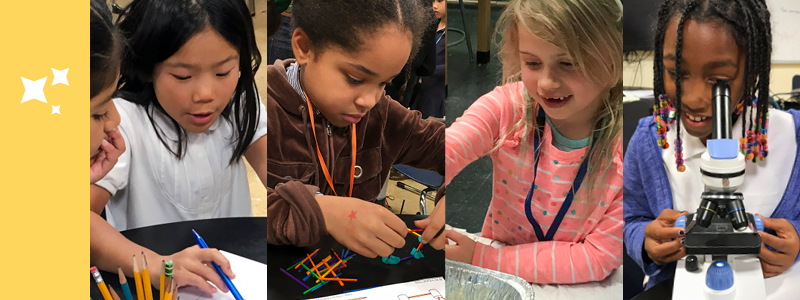
- This event has passed.
Investigating Space: Stellar Scientists
March 19, 2022 @ 11:00 am - 4:00 pm

Celebrate Women’s History Month with talks and activities led by women in STEM!
Saturday, March 19
11 a.m. – 4 p.m.
Free with General Admission
Scientific Adventures for Girls is teaming up with Chabot Space & Science Center for an out-of-this-world day that brings together hands-on activities and interactive conversations to highlight female scientists and experiences. Engage with big questions in science while meeting women in space exploration, building rockets, dreaming up planets and more!
Investigating Space
Join us every third Saturday of the month for Investigating Space as we explore and discuss the big topics in space exploration with some of the leading scientists and researchers in the Bay Area. In this new series, Chabot Space & Science Center highlights the latest discoveries, science research and space missions.
Investigating Space is hosted by long-term Chabot Galaxy Explorer Maxwell Edmonds-Drati.
About Scientific Adventures for Girls
Scientific Adventures for Girls provides after-school STEM programs to children in TK-6th grade, with a special focus on girls and youth in marginalized communities, to increase positive attitudes toward STEM, increase hands-on learning opportunities and encourage lifelong learning of STEM subjects.
Schedule
12 p.m. Astronaut Yvonne Cagle in conversation with CaT Bobino, Studio 3
Join moderator CaT Bobino in conversation with NASA astronaut Yvonne Cagle. Yvonne Cagle is an astronaut, a scientist, and a doctor. STEM advocate CaT Bobino will engage with Dr. Cagle and to explore her inspiring life story of embracing science, a devotion to education and a pursuit of space and medicine.
About Dr. Yvonne Cagle
Dr. Yvonne Darlene Cagle is an astronaut for the National Aeronautics and Space Administration (NASA), and consulting professor for Stanford University’s department of Cardiovascular Medicine and its department of Electrical Engineering. A retired Colonel of the US Air Force, Dr. Cagle served as a certified flight surgeon, where she began her medical career. Dr. Cagle has also served as a certified senior aviation medical examiner for the Federal Aviation Administration and a qualified advanced cardiac life support instructor.
Dr. Cagle currently is the chief scientist for the Level II Program Office of NASA’s Commercial Reusable Suborbital Research program.
About CaT Bobino
CaT Bobino is a Bay Area biologist, teacher, speaker, host, and a dedicated STEM Ambassador. Through her work in media and in the community Ms. Bobino is diversifying and demystifying STEM. On her weekly podcast she interviews diverse people in STEM as a way of showcasing and expanding the access and opportunities available to Bay Area youth. She has also organized trips to various STEM centers, has been a guest speaker for numerous organizations and is the author of In The Know: Setting Up Your Child For A STEM Career. Ms. Bobino has been featured on the show Genius with Stephen Hawking and has also written, directed, and starred in programs for KQED. Ms. Bobino holds a master’s degree in Biology and is currently developing her own business and nonprofit.
2 p.m. Dr. Natasha Batalha, Unveiling the Nature of Terrestrial Worlds with Next-Generation Space Missions, Studio 3
NASA’s Kepler Mission sought to answer a simple question: Do rocky planets, like Earth, exist elsewhere in our galaxy? We now know that not only do terrestrial worlds exist in our galaxy, but they also exist in abundance. Now we can consider: Where did we come from? Is the habitability of our planet unique? Does life exist beyond the Solar System? The answers lie in the chemical makeup of the atmospheres of these distant worlds called exoplanets. NASA’s next generation space telescope, James Webb Space Telescope (JWST) – which just successfully launched in December – has 6.25x the photon collecting area, up to 100x the resolution, and 10x the spectroscopic wavelength coverage compared to the Hubble Space Telescope.
Batalha will give insights into the first objects JWST will look at, including one planet which could be potentially habitable. NASA’s future missions’ endeavor to directly image planets in hopes of detecting signatures of biology. Batalha will discuss what we need to do today to ensure these goals are realized in the coming decades.
About Dr. Natasha Batalha
Dr. Natasha Batalha is a scientist at NASA Ames Research Center who studies the atmospheres of worlds beyond the Solar System, also called exoplanets. She has a bachelor’s degree in Physics from Cornell University and a dual PhD from The Pennsylvania State University in Astrobiology & Astrophysics.
11 a.m. – 3 p.m. Aeronautic Activities with Scientific Adventures for Girls and UC STAR, Studio 3
Learn all about flight and space with three hands-on activities hosted by UC Berkley STAR and SAFG.
Rubber Band Airplanes: Get to know more about how to fly by building your own rubber band airplanes with UC Berkeley STAR! Learn about forces like thrust, drag, lift and weight while creating your very own model airplane.
Rocket Engine Simulation: Build, simulate, and design your own rocket engine with the goal of reaching space! Learn the kinds of forces, fuels, and stability is required to create safe flight so satellites and astronauts can make it into space!
Exploring the Lunar Surface: Get to know the moon by visiting the lunar surface, using a model to understand how comet impact craters alter the appearance, and tell us the history of the moon. You’ll also make and take a moon phases journal, to continue your moon exploration at home!
About Scientific Adventures for Girls
Scientific Adventures for Girls provides after school STEM programs to children in TK-6th grade, with a special focus on girls and youth in marginalized communities, to increase positive attitudes toward STEM, increase hands-on learning opportunities and encourage lifelong learning of STEM subjects.
About UC Berkeley STAR
Space Technologies and Rocketry at Berkeley, or STAR, is UC Berkeley’s premier competition high-power rocketry team. STAR boasts the longest and most successful launch history on campus, with a total of six complete vehicles engineered over our half decade lifetime.




